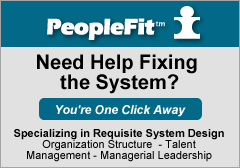Technical Issues – Mission Minded Management Is Back
By Michelle Malay Carter on May 26, 2009
My ability to post mysteriously disappeared.?? It appears to be back.
I’m OK.? You’re OK.? My system needed fixing!
Filed Under Requisite Organization | 2 Comments
Elliott Jaques – Requisite Featured Guru at The Economist
By Michelle Malay Carter on May 11, 2009
 The Economist has recently profiled Elliott Jaques, the creator of my favorite meta-model, Requisite Organization.
The Economist has recently profiled Elliott Jaques, the creator of my favorite meta-model, Requisite Organization.
The profile is adapted from ?The Economist Guide to Management Ideas and Gurus?, by Tim Hindle (Profile Books; 322 pages). The guide has the low-down on more than 50 of the world?s most influential management thinkers past and present and over 100 of the most influential business-management ideas.?
If you want to learn more about Requisite Organization, why not register for my three-hour Requisite Organization introductory course being held June 5th, Raleigh, NC, USA.? I’d love to meet you.
I’m OK.? You’re OK.? Let’s fix the system.
Filed Under Requisite Organization | Comments Off on Elliott Jaques – Requisite Featured Guru at The Economist
Requisite Organization Design – Flat Ain’t All That, but Neither is Fat
By Michelle Malay Carter on April 29, 2009
 A client who is undergoing a Requisite Organization implementation received the following question from an employee, and I helped craft a response which you can read below.? They modified my suggested response before diseminating, and I added the pithy subheads before posting this.
A client who is undergoing a Requisite Organization implementation received the following question from an employee, and I helped craft a response which you can read below.? They modified my suggested response before diseminating, and I added the pithy subheads before posting this.
With more companies moving away from hierarchy-type organizations, how is a deeply more pronounced hierarchy at ClientCompany going to make it more effective?
Yes, People Are Hurt By Poorly Designed Organizations
It?s a sad reality that people get hurt and frustrated at work. The current trend is to blame hierarchies for this hurt because they seem to be the common denominator.
What Are the Real Issues?
In reality, it is uninformed organizational design, unclear accountability and authority, and lack of checks and balances within hierarchies that are the problem, not the hierarchies themselves.? The Requisite Leadership Framework that ClientCompany is adopting addresses each of these issues.
Hierarchy Does Not Equal Bad
Hierarchies, like bacteria, are not inherently bad.? Hierarchies are a natural form of human organization and have been observed within the earliest forms of civilization.? Remember, if there is even ONE leader within a group, a hierarchy exists.? What would the alternative be?
Egalitarianism??
Everyone is?accountable for working the teller line, making loans, cleaning the bathrooms, answering the phone, writing computer programs, and deciding where millions of dollars of deposits would be invested.
The problem is that everyone wants to take credit when all goes well, but there is only irresolvable finger pointing when things do not go well.? Who decides what to do then?? Who decides who does what job?? What is done when someone refuses to do a job assigned?? How is it decided who gets to assign work to whom?? How can someone be fired or hired?? Remember, there are no leaders.? The leader becomes the one with the biggest personality or the greatest ability to manipulate.
Use Knowledge to Design Effective Hierarchies
Back to our bacteria analogy, bacteria is not a problem per se, and eliminating all bacteria would destroy our ecosystem. ?Once we understand the properties of bacteria, we can use that knowledge to use bacteria to our advantage and reduce or eliminate the damage it can cause.? When there is too much, too little, or the wrong mix of bacteria, the efficiency and effectiveness of natural order of the system is affected.
It’s About Work Levels
Despite best intentions, ignorance surrounding work levels has left most people working in inefficient and ineffective organizational hierarchies that destroy productivity and morale.? It?s no wonder hierarchies get a bad rap.
The requisite organization framework helps us understand work by level and this allows us to create an organization design that results in natural order, efficiency, and effectiveness.? When organizational layering is correct without too many or too few layers, communication and assignments flow naturally up and down the hierarchy.
Neither Flat Nor Fat
It is only when there are too many or too few layers that communication and work either get bogged down or lost, resulting in frustration and inefficiency. R equisite understanding allows us to build a structure that will allow each employee to work at their full potential and to be led my someone who can offer appropriate leadership.
People welcome leaders who lead.? People resent being asked to work for someone who cannot lead them. The requisite model helps us provide employees with satisfying leadership.
Power Corrupts; Absolute Power Corrupts Absolutely
Can there be abuse of power within a hierarchy?? Of course, this is another danger.? The Requisite model pairs hierarchy with clear accountabilities, authorities, and checks and balances to reduce the likelihood of this common problem.
Adding accountabilities to the job description of all managers-once-removed is a unique characteristic of the requisite model designed to ensure that more than one set of eyes is on any given employee.? The manager-once-removed is accountable to ensure that his/her direct reports once removed (two layers down) are being treated fairly and are being considered for advancement and development.
Stick Out Your Arm Please
Before medical science understood bacteria, techniques like bloodletting were commonplace.? They were desperate attempts to do something to stop the pain.? Calling for the elimination of hierarchy or ?flat organizations?, etc. divorced from an understanding of work levels is simply the same thing, a hopeful attempt to reduce the pain caused by a poorly designed hierarchy.
Requisite Organization Payoff
We believe organizing requisitely will allow employees to work at their full potential, under the guidance of a satisfying leader, with the additional oversight and career mentoring of a manager once removed.? Additionally, we believe organizing requisitely will allow ClientCompany to continue to thrive in the future and provide a healthy workplace for its employees.
I’m OK.? You’re OK.? Let’s fix the system.
Filed Under Accountability, Executive Leadership, Managerial Leadership, Organization Design, Requisite Organization, Talent Management, Work Levels | Comments Off on Requisite Organization Design – Flat Ain’t All That, but Neither is Fat
A Requisite Failure to Communicate – A Friday Funny
By Michelle Malay Carter on April 24, 2009
Requisite Organization Efficiency in Language
One of the greatest benefit our clients receive by adopting a Requisite Organization Leadership Framework is a common language to be able to talk about talent assessment, high potentials, and organization design.? It allows them to diagnose issues quickly and design work enabling organizations.
Who is Right?
I’ve said before, you and I can argue all day about whether the room we are in is hot or cold and never come to agreement.?? However, together we could stroll over to the thermostat and agree the that room is 70 degrees.? A common Requisite vernacular allows managers to say, this role is at work level three.? I’ve seen Susie demonstrate level-three capability when she successfully planned and executed?this 18 month project.
What We Have Here is a Failure to Communicate
This three-minute BBC skit reveals the pitfalls inherent in lacking a common language.? It’s a little longer than I normally post, but worth it, especially if you are a Hugh Laurie (aka Dr. House) fan.
?
Have you ever experienced a communication failure?
Filed Under High Potential, Managerial Leadership, Organization Design, Requisite Organization, Talent Management, Work Levels | 1 Comment
High Potential + Zero Opportunity = A Tragic Waste
By Michelle Malay Carter on April 22, 2009
 On a similar note as my post, Cognitive Surplus Gone Bad at San Diego State, it turns out the surviving teenage Somali pirate was?not just a flunky, he was the ring leader.?
On a similar note as my post, Cognitive Surplus Gone Bad at San Diego State, it turns out the surviving teenage Somali pirate was?not just a flunky, he was the ring leader.?
According to the AP and the Fort Worth Star Telegram, “Abdiwali Abdiqadir Muse grew up destitute in Somalia, the oldest of 12 children and the product of a violent, lawless nation where his parents scraped together a few dollars a day selling milk and tending to a small herd of camels, cows and goats.”
“He eventually joined a gang of pirates who laid siege to an American cargo ship and took the captain hostage before three of them were killed by Navy snipers. Muse survived but was stabbed in the hand with a knife, telling a crew member after the attack that it was always his dream to come to America.”
The 18 year-old has?made it to America, charged with piracy, conspiracy, and brandishing and firing a gun during a conspiracy.
Cognitive Trajectory Appears Early
I’ve contended that high potential shows itself at a young age.? My children could tell me in kindergarten who the “smartest” kid in class was.? They are pretty matter of fact about it.? Research shows that those on a high potential cognitive trajectory will continue on a steeper cognitive development slope than most throughout their lives.? Interestingly, we think once we hit adulthood, all differences are nullified and?anybody can be anything with a little training and determination.
Although this philosophy is used as encouragement and liberation, I think it leaves many feeling frustrated and inadequate and others prideful and judgmental, but I digress.
A Mother Knows
Back to the?AP story, “The details of Muse?s life are murky, with his parents in Somalia insisting that he was tricked into getting involved in piracy. His mother said he was “wise beyond his years” ? a child who ignored other boys his age who tried to tease him and got lost in books instead.”
I’m OK.? You’re OK.? Let’s fix the system.
What has your experience been?
Filed Under High Potential, Personal Observation, Talent Management | Comments Off on High Potential + Zero Opportunity = A Tragic Waste
Requisite Organization – Endlessly Misunderstood
By Michelle Malay Carter on April 21, 2009
 Requisite Organization is a meta-model created by Elliott Jaques.? When people oppose it, I generally find their opposition to be based upon misunderstanding.
Requisite Organization is a meta-model created by Elliott Jaques.? When people oppose it, I generally find their opposition to be based upon misunderstanding.
A client who is undergoing a Requisite Organization implementation received the following question from an employee, and I helped craft a response.? Hierarchy bashing is en vogue these days, but what is the basis for it?
With more companies moving away from hierarchy-type organizations, how is a deeply more pronounced hierarchy at ClientCompany going to make it more effective?
What Requisite Organization is NOT
This question is based upon an untrue but common?perception. ?Requisite Organization is not about creating a more pronounced hierarchy. Too many layers within an organization slows down decisions and confuses people, but too few layers is not the solution?either.??Having too few layers?impedes understanding and leaves some lost and others left to cover multiple layers of work.
What Requisite Organization IS
Requisite Organization is about understanding hierarchy and building one that will facilitate work and communication.? If you are in the Carolina area, why not join me for a three hour introductory Requisite Organization course on June 6?
I will post my specific response tomorrow.? I’m OK.? You’re OK.? Let’s fix the system.
Are you confused about Requisite Organization?
Filed Under Organization Design, Personal Observation, Requisite Organization | Comments Off on Requisite Organization – Endlessly Misunderstood
Stop the Vicious Cycle by Discovering — It’s Not All About You
By Michelle Malay Carter on April 15, 2009
 To continue on my life lesson theme from my last post, Is the Story You Are Telling Yourself Helpful, today I want to point out that it’s not all about you!
To continue on my life lesson theme from my last post, Is the Story You Are Telling Yourself Helpful, today I want to point out that it’s not all about you!
When we realize that people rarely do things “to us”, “at us”, “because of us”, but rather because of what is going on inside their interior world, we then need NOT take things personally.?
When we don’t take things personally, we do not judge others and build resentment.?
When we do not judge others and build resentments, we do not sabotage our relationships and set them into a vicious downward spiral of unhelpful stories that we play in our heads about one another.?
Once?we decide someone is petty or mean or prideful, we?then frame all their actions to fit our “profile” of them.
For example, when someone ignores us, we can decide, she doesn’t like me (notice the me focus) or we can assume they didn’t see us, were distracted, didn’t feel like talking, etc.? If?I were to make the first assumption, then my relationship with that person will be negatively affected in the future.? If I don’t take it personally, the next time I see the person, we still have a clean slate.
If your husband doesn’t take you on dates, you could decide it’s because he doesn’t love you, or you make the observation that he simply prefers to stay at home.? Which is the more helpful perspective?
How many relationships have we damaged at work and in our personal lives by making things about us?
Filed Under Managerial Leadership, Personal Observation | 1 Comment
Is the Story You are Telling Yourself Helpful?
By Michelle Malay Carter on April 11, 2009
 My former manager, Becky, had a slew of health sensitivities.? She did not eat meat.? She could not tolerate dairy; she was sensitive to many fragrances;she was allergic to lanonlin, an ingredient in many cosmetics and lotions.
My former manager, Becky, had a slew of health sensitivities.? She did not eat meat.? She could not tolerate dairy; she was sensitive to many fragrances;she was allergic to lanonlin, an ingredient in many cosmetics and lotions.
I remember sitting in her office one day as she ran down this extensive list, and I was thinking, “Man, some of those things I could live with, but I don’t know if I could give up cheese.? I’m glad I don’t have any of those ailments;?she must lead a difficult life….”
Nothing is Neither Good Nor Bad, but Thinking Makes It So – Shakespeare
As I was thinking these things, she looked at me and smiled and said something along the lines of, “God must have a plan for me to live a long, full life since he is keeping me away from these things that are not good for my body.”
I remember being shocked by her cheerful, grateful approach to what I was seeing as a major burden and inconvenience.
What’s the point?? If you can’t change your less-than-desirable circumstances, you can change the way you look at them.?
Is the story you are telling yourself about a troublesome circumstance helpful?
Thank you to my colleague, Jim Hines,?a Systems Dynamics?consultant,?for posing that powerful question.
Filed Under Personal Observation, Strategy | 6 Comments
Rewarding OverPerformers with UnderPerformers’ Work – An Employee Engagement Buster
By Michelle Malay Carter on April 9, 2009
 Ignoring NonPerformance
Ignoring NonPerformance
You’ve seen it.? I’ve seen it.? I’ve lived it, and you probably have too.? Why is so pervasive?? Instead of addressing the issue of employees not performing in a role, managers simply give the nonperformers’ undone work to their outstanding performers.
Why Not Take the Easy Way Out?
Is it human nature?? Yes. ?It is certainly easier to give work to a “go-to” employee than it is to performance manage someone who is not delivering.? But what does this say about our managerial leadership systems?
It’s the System!? Or Lack Thereof
What managerial leadership system you say?? Exactly.? Far too many organizations do not explicitly hold their managers accountable to exercise managerial leadership.? They have not defined what requisite?managerial leadership behaviors are expected, nor do they appear on job descriptions, or performance appraisals.? What gets measured is whether managers get the work done, not whether they abuse some?team members?and coddle others to do so.
Why Engagement Sits at About 20%
This is just another of many reasons why engagement sits at about 20%.?
I’m OK.? You’re OK.? Let’s fix the system.
Have you ever been rewarded for your high performance with the undone work of a nonperformer?
Filed Under Requisite Organization | 2 Comments
Requisite Organization Introduction Training Course – June 5 – Raleigh – Durham, NC, USA
By Michelle Malay Carter on March 29, 2009
Curious about Requisite Organization?? Join us for a 3 hour introductory course in June.
Bringing Leadership Science to OD and HR
June 5, 2009
Regus Corporate Center, Meridian Parkway, Durham
8:30 am – 11:30
$170 – Click to Register and Pay Online
Many mainstream management models focus on fixing individual employees through training or coaching, rather than addressing systemic issues that drive dysfunctional behavior. This is only half the story.
A Systems View Diagnostic Model
Training and coaching can help under some circumstances, with some people, sometimes. This course offers participants a powerful, science-based diagnostic model for determining who and what will work, when, and why.
Workshop Take-Aways
At the end of this workshop, participants will understand the Requisite Organization framework that allows them to:
- Match employees to roles that allow for the fullest expression of their gifts.
- Match employees to managers who can provide them satiating leadership.
- Structure the organization to catalyze free flow of communication and leadership both vertically and horizontally.
Creating Work Enabling Organizations
Work has the potential to be a noble, highly-gratifying expression of a unique human soul. This course will show participants how to structure their organizations to support employees and enable their work.
I?m OK. You?re OK. Let?s fix the system.
Space Is Limited to 18 Participants – Register Today
If you?re tired of fixing employees and are ready to address the system, click here to register and pay.
Speakers
Mission Minded Management blogger, Michelle Malay Carter will lead this course and George Smart of Strategic Development will speak briefly on his application of these ideas to executive coaching ? and solving the problems typically faced by executives seeking coaching.
Filed Under Requisite Organization | 2 Comments
